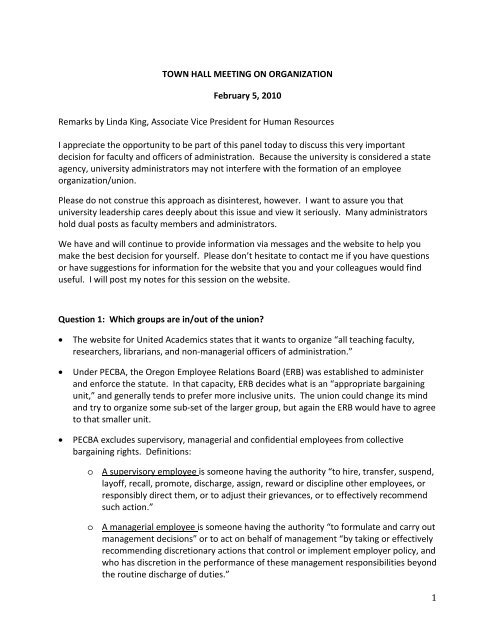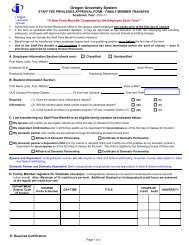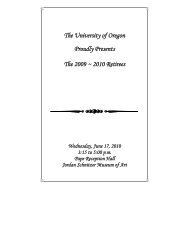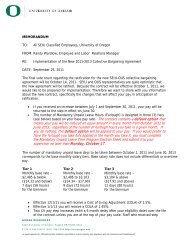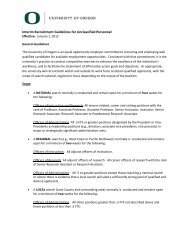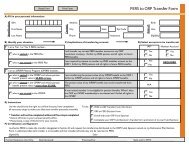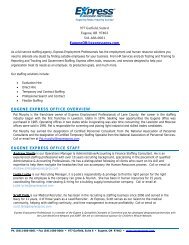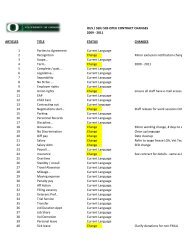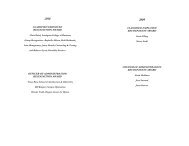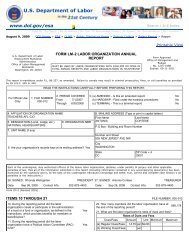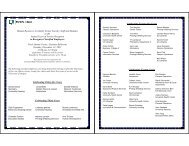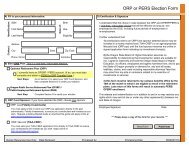Talking Points for February 5, 2010 Town Hall Meeting, Linda King ...
Talking Points for February 5, 2010 Town Hall Meeting, Linda King ...
Talking Points for February 5, 2010 Town Hall Meeting, Linda King ...
Create successful ePaper yourself
Turn your PDF publications into a flip-book with our unique Google optimized e-Paper software.
TOWN HALL MEETING ON ORGANIZATION<br />
<strong>February</strong> 5, <strong>2010</strong><br />
Remarks by <strong>Linda</strong> <strong>King</strong>, Associate Vice President <strong>for</strong> Human Resources<br />
I appreciate the opportunity to be part of this panel today to discuss this very important<br />
decision <strong>for</strong> faculty and officers of administration. Because the university is considered a state<br />
agency, university administrators may not interfere with the <strong>for</strong>mation of an employee<br />
organization/union.<br />
Please do not construe this approach as disinterest, however. I want to assure you that<br />
university leadership cares deeply about this issue and view it seriously. Many administrators<br />
hold dual posts as faculty members and administrators.<br />
We have and will continue to provide in<strong>for</strong>mation via messages and the website to help you<br />
make the best decision <strong>for</strong> yourself. Please don’t hesitate to contact me if you have questions<br />
or have suggestions <strong>for</strong> in<strong>for</strong>mation <strong>for</strong> the website that you and your colleagues would find<br />
useful. I will post my notes <strong>for</strong> this session on the website.<br />
Question 1: Which groups are in/out of the union?<br />
• The website <strong>for</strong> United Academics states that it wants to organize “all teaching faculty,<br />
researchers, librarians, and non-managerial officers of administration.”<br />
• Under PECBA, the Oregon Employee Relations Board (ERB) was established to administer<br />
and en<strong>for</strong>ce the statute. In that capacity, ERB decides what is an “appropriate bargaining<br />
unit,” and generally tends to prefer more inclusive units. The union could change its mind<br />
and try to organize some sub-set of the larger group, but again the ERB would have to agree<br />
to that smaller unit.<br />
• PECBA excludes supervisory, managerial and confidential employees from collective<br />
bargaining rights. Definitions:<br />
o A supervisory employee is someone having the authority “to hire, transfer, suspend,<br />
layoff, recall, promote, discharge, assign, reward or discipline other employees, or<br />
responsibly direct them, or to adjust their grievances, or to effectively recommend<br />
such action.”<br />
o A managerial employee is someone having the authority “to <strong>for</strong>mulate and carry out<br />
management decisions” or to act on behalf of management “by taking or effectively<br />
recommending discretionary actions that control or implement employer policy, and<br />
who has discretion in the per<strong>for</strong>mance of these management responsibilities beyond<br />
the routine discharge of duties.”<br />
1
Management employees do not have to be supervisory, but the term<br />
“managerial employee” specifically “does not include faculty members at<br />
a community college, college or university.”<br />
o A confidential employee is someone “who assists and acts in a confidential capacity<br />
to a person who <strong>for</strong>mulates, determines and effectuates management policies in the<br />
area of collective bargaining.”<br />
• Initially the university designates jobs as supervisory, managerial, or confidential in<br />
accordance with PECBA and, as such, excluded from the bargaining unit. These<br />
designations may be contested by the union with ERB ultimately making the<br />
determination regarding inclusion or exclusion from collective bargaining.<br />
Question 2: What aspects of university life are “covered” by the union?<br />
To answer this question, we have to consider three relationships:<br />
• The relationship between the university and the union is governed by PECBA and<br />
relevant statutes.<br />
• The relationship between the university and union-represented faculty and staff would<br />
to a large extent be governed by the union contract bargained by the university and the<br />
union. Currently this relationship is found in OUS and UO administrative rules (OARs).<br />
• The relationship between union-represented employees and their union is governed by<br />
the union’s constitution and bylaws.<br />
Legal context: The relationship between the university and the union<br />
The relationship between the university and the union is governed by state statutes concerning<br />
bargaining between the university and the union. Oregon statues say:<br />
• Both the university and the union have an obligation to bargain in good faith with<br />
respect to “employment relations.”<br />
• Issues that do not fall within the definition of “employment relations” are not<br />
mandatory subjects of bargaining, but these issues can be bargained if the university<br />
and the union both agree to do so.<br />
• The obligation to bargain in good faith “does not compel either party to agree to a<br />
proposal or require the making of a concession.”<br />
State statutes also provide some guidance concerning what issues are considered “employment<br />
relations” and thus are mandatory subjects of bargaining:<br />
2
• Included within the ERB’s definition of “employment relations” are “matters concerning<br />
direct or indirect monetary benefits, hours, vacations, sick leave, grievance procedures<br />
and other conditions of employment.” These are the mandatory subjects of bargaining.<br />
• Subjects that are not mandatory subjects of bargaining include:<br />
o Issues that the ERB “determines to have a greater impact on management’s<br />
prerogative than on employee wages, hours or other terms and conditions of<br />
employment.”<br />
o Subjects that “have an insubstantial or de minimis effect on public employee wages,<br />
hours, and other terms and conditions of employment.”<br />
o Such issues as “scheduling of services provided to the public, determination of<br />
minimum qualifications necessary <strong>for</strong> any position, criteria <strong>for</strong> evaluation or<br />
per<strong>for</strong>mance appraisal, assignment of duties, workload when the effect on duties is<br />
insubstantial, reasonable dress, grooming, and at-work personal conduct<br />
requirements.”<br />
Union Contracts: The relationship between the university and union-represented faculty and<br />
professionals<br />
The relationship between the university and union-represented employees would be governed<br />
in large part by the contract bargained between the university and the union. Thus, it is helpful<br />
to review union contracts covering faculty at other Oregon universities. All five have been<br />
posted on the HR web site.<br />
o Portland State University contract with the AAUP <strong>for</strong> academic professionals<br />
working half time or more.<br />
o Southern Oregon University contract with the Association of Professors, an<br />
independent union that only exists at SOU.<br />
o Western Oregon University contract with the AFT.<br />
o Eastern Oregon University contract with the AFT.<br />
o Portland State University contract with the AFT <strong>for</strong> academic professionals working<br />
less than half time.<br />
Although the five contracts have significant differences, there are consistencies in some areas. I<br />
will summarize briefly the provisions that have the most direct effect on the work lives of<br />
union-represented faculty and professionals.<br />
3
Employee payments to the union<br />
o Each states that union-represented employees must pay the union that represents them<br />
either via union dues or “fair share.” AFT recently increased dues at WOU by 25% to<br />
finance organizing drives at UO and OSU.<br />
• Management rights<br />
o Each lists rights that continue to belong exclusively to university management, such as<br />
the rights to hire, promote, demote, transfer, suspend, discipline, discharge, test, direct<br />
and schedule employees and to control the use of university property.<br />
• Types of faculty and appointments<br />
o Each describes various categories of fixed-term and tenure track faculty.<br />
o Each outlines the process <strong>for</strong> faculty appointments, including appointments <strong>for</strong> summer<br />
term.<br />
• Assignment of duties/teaching load<br />
o Most of the contracts include definitions of normal teaching loads with language that<br />
allows the university to assign faculty work load based on institutional needs and goals.<br />
• Salary<br />
o Each describes salary steps and percentage increases, if any, <strong>for</strong> each category of<br />
represented employees.<br />
o The new contracts at PSU and SOU call <strong>for</strong> unpaid furloughs to achieve pay reductions.<br />
At PSU reductions range from 1.15% <strong>for</strong> the lowest-paid faculty to 4.38% <strong>for</strong> the<br />
highest-paid. At SOU, 4.6% is the maximum amount that a faculty member’s pay may<br />
be reduced.<br />
• Progressive sanctions/disciplinary procedure<br />
o Each describes the steps through which disciplinary procedures are to progress.<br />
o Each states that employees undergoing disciplinary action have the right to request<br />
union representation.<br />
o Two contracts list offenses <strong>for</strong> which union-represented faculty and professional staff<br />
can be disciplined.<br />
• Grievance and arbitration<br />
o Each states that grievances may only be filed concerning alleged violations of the union<br />
contract, and may not be filed over matters related to academic judgment.<br />
4
o Each outlines the stages through which grievances proceed and the time limits that are<br />
associated with each step.<br />
o Each states that grievances can be taken to arbitration only with the approval of the<br />
union.<br />
o The PSU/AAUP contract states that the union must file the grievance on behalf of the<br />
bargaining unit employee; the three other contracts allow bargaining unit employees to<br />
represent themselves if they so choose.<br />
• Professional development & support<br />
o Each specifies how much is set aside <strong>for</strong> faculty development and travel.<br />
o Each describes a procedure <strong>for</strong> determining how and to whom funds are to be awarded,<br />
with management retaining the right to decide who receives support.<br />
• Evaluations, tenure and promotion<br />
o Each outlines procedures and timelines <strong>for</strong> per<strong>for</strong>mance evaluations and decisions<br />
regarding promotion and tenure.<br />
o Each acknowledges that university management retains the right to set per<strong>for</strong>mance<br />
standards and make tenure and promotion decisions.<br />
• Layoff and retrenchment<br />
o Each states that university management has the right to determine when a layoff or<br />
retrenchment is required due to financial exigency, program or discipline curtailment or<br />
retrenchment.<br />
o Although contracts vary slightly, the order in which personnel are laid off generally is<br />
determined by:<br />
a. The needs of the program or division;<br />
b. Kind of appointment: e.g., fixed term appointments shall be laid off annual<br />
tenure appointments, who are laid off be<strong>for</strong>e indefinite tenure appointments;<br />
c. Seniority.<br />
• Tenure relinquishment and early retirement<br />
• Each outlines procedures <strong>for</strong> early retirement.<br />
• Leaves<br />
o Each describes factors determining eligibility <strong>for</strong> sabbatical leave and procedures <strong>for</strong><br />
awarding such leaves.<br />
5
o Each describes procedures regarding sick leave, vacation leave and other paid leaves<br />
of absence, such as jury duty and military leave.<br />
o Most contracts describe procedures regarding unpaid leaves of absence, which<br />
typically are granted at the discretion of university management.<br />
• Academic freedom and faculty governance<br />
o The PSU/AAUP and SOU/AP contracts state that faculty bylaws will continue to be in<br />
effect; the PSU/AFT, WOU/AFT and EOU/AFT contracts do not.<br />
o The EOU/AFT and PSU/AFT and SOU/AP contracts state that faculty should not<br />
introduce material into the curriculum and classroom that is not relevant to the<br />
subjects they teach. However, neither contract indicates how this principle is to be<br />
observed or en<strong>for</strong>ced. The PSU/AAUP and WOU/AFT contracts place no restrictions<br />
on course content.<br />
• Outside employment<br />
o The PSU/AAUP, WOU/AFT and EOU/AFT contracts contain guidelines related to<br />
employment outside the university and prohibit conflicts of interest as determined<br />
by university management.<br />
o The WOU/AFT contract states that outside employment may not involve the use of<br />
university equipment, supplies or facilities.<br />
Union constitutions and bylaws: The relationship between union-represented employees and<br />
the union<br />
The relationship between bargaining unit employees and the union is governed by union<br />
constitutions and bylaws. As their exclusive representative, the union makes decisions that<br />
affect the work practices and environment of those in the bargaining unit.<br />
Union constitutions and bylaws govern how and by whom union decisions are made. Although<br />
there are many differences between the constitutions and bylaws of PSU/AAUP, SOU/AP,<br />
WOU/AFT and EOU/AFT, there also are some consistent practices. No bylaws could be<br />
obtained <strong>for</strong> PSU/AFT. These are available on HR website.<br />
Topics covered in these documents:<br />
Membership<br />
• Membership in good standing is contingent on timely payment of union dues and fees.<br />
• Only members have any voice in union affairs or can hold union office, and non-members<br />
may be excluded from union meetings.<br />
6
Executive Council<br />
• Elected by the membership, officers comprising the Executive Council have the authority to<br />
govern the local union by setting policies, creating committees and appointing their<br />
members, spending union funds, and hiring union employees and setting their wages and<br />
benefits.<br />
Committees<br />
• Standing committees are appointed by the Executive Council.<br />
• Local union committees typically include:<br />
o Bargaining Committee<br />
o Elections Committee<br />
o Grievance Committee<br />
o Membership Committee<br />
o Communication/Political Action Committee<br />
Grievances handling<br />
• Union members who act as representatives <strong>for</strong> other members filing grievances are<br />
selected by the union executive council or by vote of union membership.<br />
Contract ratification and strike vote<br />
• Members of the union’s bargaining committee are appointed by the Executive Council.<br />
• Proposed contracts are ratified via secret ballot by a majority of the members who<br />
participate in the vote.<br />
• Authorization <strong>for</strong> the union to call a strike is done via an open vote of the members, not a<br />
secret ballot vote.<br />
Quorum:<br />
• Quorum ranges from 10% - 25% of the membership.<br />
I hope you will check out the websites established to provide you in<strong>for</strong>mation about this<br />
organizing ef<strong>for</strong>t.<br />
7


